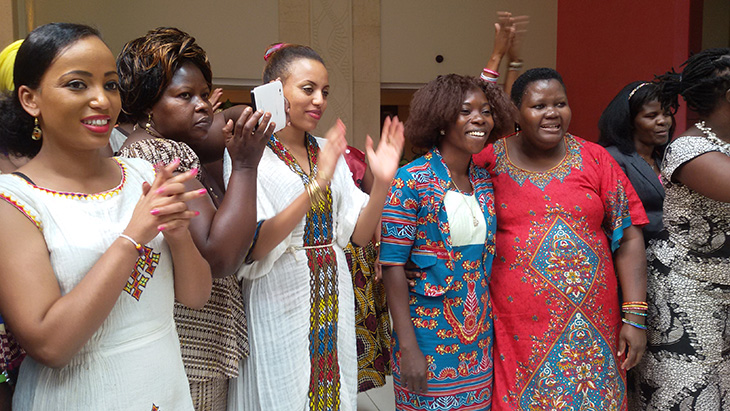The Health Policy Project ended in 2016. Work continued under Health Policy Plus (HP+) until 2022.
NEWS & VIEWS

Health Policy Project
By Anne Jorgenson, Health Policy Project, Plan International USA
NAIROBI, Kenya—On July 14, 2014, the Health Policy Project’s third annual Women’s Leadership in Family Planning and Reproductive Health Workshop brought together 22 women from six countries—Ethiopia, Ghana, Kenya, Malawi, Tanzania, and Uganda—for three weeks of intensive capacity development designed to help them become stronger leaders and more effective advocates for family planning and reproductive health (FP/RH) issues.
In many countries, women—who are most profoundly affected by limited access to FP/RH services—continue to have little influence in shaping FP/RH policies. The same social barriers that limit women’s ability to access family planning services can also hinder their participation in decision-making processes. The Health Policy Project (HPP) works to empower women leaders—equipping them with the tools and skills they need to gain a greater voice in the policy process.
HPP’s Women’s Leadership workshops are designed to strengthen women’s roles and voices in defining country priorities and promoting support for FP/RH. Through their intentional focus on leadership in the company of other women, the workshops offer women leaders a unique opportunity to come together to learn from each other, while building confidence and honing their skills.
Leveraging CEDPA’s decades of experience fostering women’s leadership, HPP facilitators used highly participatory training methodologies to strengthen participants’ personal leadership, advocacy, and facilitation skills, as well as their ability to integrate gender considerations into FP/RH policies and programs. To maintain the momentum generated by the workshops, HPP provides support through a year-long, individual coaching program, and offers small grant opportunities to support implementation of advocacy plans and expand in-country networks of women leaders and FP/RH champions.
Opening the 2014 workshop, Dr. Kibaru-Mbae, Director General of Kenya’s National Council for Population and Development, highlighted the lasting benefits of this capacity development approach. Dr. Kibaru-Mbae attended an advocacy training hosted by HPP’s predecessor, the POLICY Project, over a decade ago. She told participants at this year’s workshop that she has called upon those skills time and time again as she has rallied decisionmakers in Kenya to support FP/RH.
“It will change their lives”
The power of HPP’s intensive approach lies in its ability to move participants on a personal level. The learning experience emboldens the women to discover and appreciate their own strengths, talents, and leadership potential. Coming from countries that still have cultural and traditional gender barriers to women’s advancement, this learning makes all the difference. As one participant told facilitators at the end of the third day, “I’m already changed.”
Participants later divided into country teams to identify key FP/RH advocacy issues, and developed draft advocacy strategies to encourage decisionmakers to take action. Some teams focused on working with the armed services to increase male involvement in FP/RH. Others focused on raising the legal age of marriage to improve the health and well-being of girls by keeping them in school and delaying pregnancy. Still others planned to advocate for community-based distribution of injectable contraceptives to increase access to family planning for women in rural areas, where access to health facilities is often limited.
By the third week, participants were already demonstrating newfound skills and confidence, and a passionate desire to put these to the test. They urged facilitators to get content posted online so they could begin using social media to share their experiences. After three weeks, they still wanted more. At 6:30PM on the last day of the workshop, the facilitator pointed out that they needed to start wrapping up. The response was immediate and unanimous—“No! Please continue!”
This passion is understandable, given what’s at stake. As Dr. Kibaru-Mbae reminded her audience: “…as FP/RH leaders, you should always keep your eyes on the bigger picture. The lives of women and children, who are the backbone of the community, depend on us.”
******
For more information: The USAID-funded Health Policy Project’s work on women’s leadership on FP/RH in Africa is part of a range of HPP activities that seek to empower women and address gender equality in health. For more information on HPP’s work on FP/RH, capacity development and gender, visit our website at www.healthpolicyproject.com.
What's New
- Something to Build On: “Innovation Exchange” Celebrates the Health Policy Project’s Close and a New Beginning
- What Will it Take for Tanzania to Achieve ART Targets and Ensure Long-Term Sustainability of the HIV Response?
- Helping Kenya’s County Leaders Advocate for Increased Health Investments
- HPP Holds Working Meeting on Ensuring Responsible PEPFAR Transitions for Key Populations
- Health Policy Project Celebrates 2016 International Women's Day
- HPP Staff Participate in White House Conference on HIV Stigma Reduction

